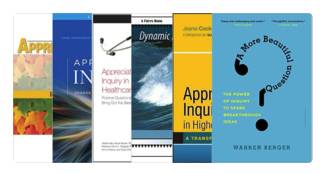News
The 20 Best Books on Appreciative Inquiry
Appreciative inquiry is a strength-based approach to address changing and is considered a constructive alternative to traditional problem-solving.
The intention in this process is to seek and leverage the best in people and place the focus more on what we want and less on what is broken.
By changing the paradigm to prospection and visioning future images, it expands what is possible. It involves asking insightful questions in a way that will heighten the positive potential of individuals and groups.
This methodology provides an opening for expanded creativity, imagination, and innovation, as opposed to the negative, critical focus of fixing something. The emphasis becomes on discovering, dreaming, and designing.
The purpose of this article is to provide a summary of books written about this popular topic of Appreciative Inquiry. While this is not an exhaustive list, we have highlighted, summarized and reviewed 20 books and hope you find this resource to be helpful.
Click here for the full article: https://positivepsychology.com/appreciative-inquiry-books/
18 Ways to Handle Emotional Blackmail (+ Examples & Quotes)
Emotional blackmail is a dysfunctional form of manipulation that people use to place demands and threaten victims to get what they want.
The undertone of emotional blackmail is if you don’t do what I want when I want it, you will suffer.
The term was introduced by Susan Forward, Ph.D., in her book Emotional Blackmail: When the People in Your Life Use Fear, Obligation, and Guilt to Manipulate You (Forward & Frazier, 1998).
She describes how emotional blackmail tactics are used by abusers to threaten in order to get what they want. In placing demands and threats, they create feelings of fear, guilt, and anger to solicit compliance from their victims. In doing so, they divert blame and responsibility to the victim for their own negative actions. Typically, this dysfunctional type of manipulation occurs in close relationships.
Emotional blackmail is a concept recently developed and one receiving increased attention. The #MeToo movement is bringing education and awareness around the dynamics of emotional abuse and its powerful negative impact. In this article, we explore the meaning behind emotional blackmail, examples of this manipulation, the damage that occurs from this emotional abuse, and ways to handle it.
Before you continue, we thought you might like to download our three Positive Relationships Exercises for free. These detailed, science-based exercises will help you or your clients build healthy, life-enriching relationships.
Click Here for the full article: https://positivepsychology.com/emotional-blackmail/
23 Resilience Building Tools and Exercises (+ Mental Toughness Test)
There is a buzz about resilience recently.
Resilience is the ability to recover from setbacks and adapt to challenging circumstances and is required to thrive and flourish.
It is a foundational psychological tool that empowers us to feel effective and capable of handling uncertainty.
Despite this definition, there has been discussion about what the essence of resilience really is. Is it a quality, skill, or personality trait? Is it genetically determined or taught?
Regardless of the exact nature of resilience, current thinking is clear. We can develop and improve our resilience. Experts confirm that resilience is a quality and a skill that can be enhanced, yet requires effort and consistency.
Before you read on, we thought you might like to download our 3 Resilience Exercises for free. These engaging, science-based exercises will help you to effectively deal with difficult circumstances and give you the tools to improve the resilience of your clients, students or employees.
Click Here for the Full Article: https://positivepsychology.com/resilience-activities-exercises/
What is Peak-End Theory? A Psychologist Explains How Our Memory Fools Us
Update March 2019: This is article on peak-end theory has been updated and extended.
We’ll walk you through the psychology behind the peak-end theory, relevant research supporting it, and how it relates to pain and pleasure. As you will see, implications for understanding the peak-end theory can be game-changing, as it impacts many areas of life.
It may surprise you to hear how biased we are in how we form memories from our experiences. Even when we think we are recalling facts about an experience, our recollection of events is typically incomplete and heavily dependent upon the feelings we were having during the experience.
It seems that our memories of positive and negative experiences are dependent upon two things: what we were feeling at the most extreme (peak) point and how the experience ended. Our memories are typically not an average of the experience or the amount of time we were engaged in the situation.
This psychological heuristic explains why we can actually be irrational in our recollection and memory of events. It also suggests that our memories consist of a series of highlights rather than a thorough record of facts and events.
Click here for the full article: https://positivepsychology.com/what-is-peak-end-theory/



